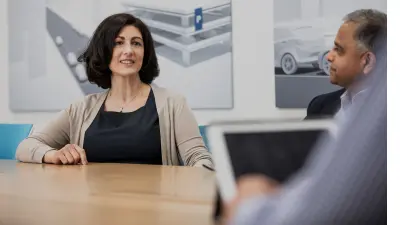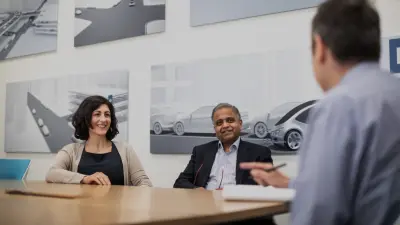Embracing Changes
In their second interview, Arun and Maurizia consider the impact of digitalisation, looking at what the advancement of technologies like robotics and artificial intelligence mean for the future of work.

Bosch has been on a journey in recent years, moving from a traditional engineering business, towards an IoT company. As the business has grown and changed, there must have been a seismic shift in the sorts of skills required within the organisation?
AS: Absolutely. Up to recent times, the priority was to employ good mechanical engineers and they are still absolutely crucial for our core business. But now we also have to consider other skills to manage the automotive architectures of the future. Moreover, with the emergence of connected, autonomous vehicles, we are going to need more computer scientists and artificial intelligence experts, too. We need a combination of all of these skills.
With all these multi-disciplinary skills in the organisation, is Bosch now a better place to work?
MB: It is a very refreshing place to work. Bosch’s journey of digital transformation has made me realise that no-one can take for granted what they have previously learnt. You have to keep up with the rapid pace of change. Mechanical engineers, for instance, have to learn about the Internet of Things – they have to gain an understanding of software-based systems. You also need to develop your confidence. That’s why it’s important to have younger people on board, as well as those with experience. It is a great way of encouraging new learning and exchanging valuable knowledge.

So, whereas in the past you might have joined Bosch and stayed doing the same thing for years, now you have to evolve as a person?
AS: That’s right. And that’s why training and development means a lot at Bosch. We encourage people to go out and see Bosch operations in different parts of the world. It’s good to explore wider horizons. I’m of the belief that opportunities present themselves most when you push yourself out of your comfort zone and take advantage of the chances that come your way -almost all learning happen outside the comfort zone. People might choose to do this at different points in time during their career but getting out there and learning new skills is a good way of doing things.
MB: That’s very true. Changing places and roles enables people to develop new skills. That’s why it is so important.
Bosch, as a company, also forms some interesting collaborative relationships with companies like Amazon and Philips. Is that also a good way of attracting people and helping them to develop their skills?
AS: Yes, we have many collaborative projects with organisations across the world. In addition, we have started to create very different businesses within Bosch. We have, for example, formed an organisation in London which looks specifically at Mobility Solutions around the world. That’s a great place to work.
How do you see the future then? We hear a lot about robotics and AI. Do you think these technologies will change the way we work?
AS: I see it as an opportunity. Industry survives through adaptation. Darwin had a point when he said it’s not the strongest that survive, it’s the most adaptable. That’s still true today. The pace of change has increased, and no jobs are guaranteed for life, but it’s not a hopeless situation. Far from it – there are a host of other skills and technologies that are being developed.
MB: We are not talking about fewer jobs in the future because of automation, we are talking about different jobs.
And they will often prove to be more interesting roles, as routine tasks are performed by AI and robotics. I see a shift where people bring much more to the roles they perform. The human being has evolved over time and will continue to do so. I’m excited.
AS: Me too. I’m excited, but we have to make sure we train people as required. In the new world, we cannot allow skill and knowledge gaps to widen. We have to make sure supply chains are robust and can meet the new requirements of the future.

